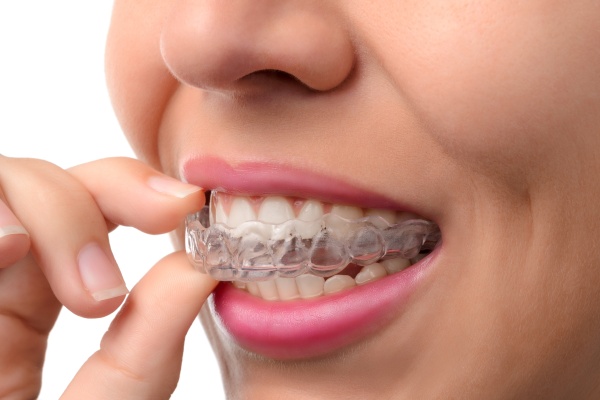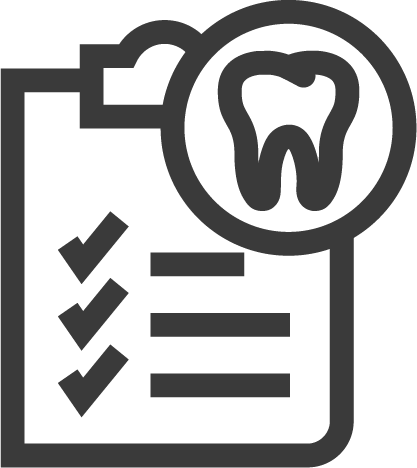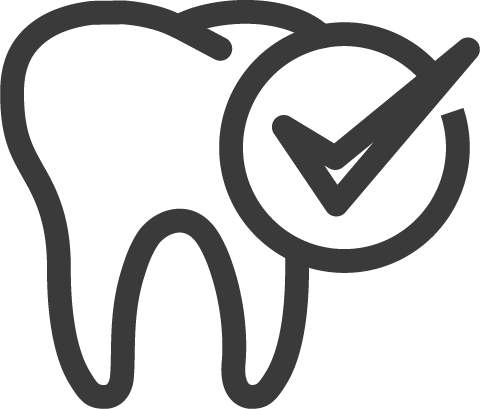A modern approach to straightening teeth, Invisible Braces such as Invisalign® or ClearCorrect® are a series of aligners (trays) that are custom-made just for you. You wear these aligner trays over your teeth and they are smooth, comfortable, and virtually invisible. As you wear the aligners, your teeth will gradually and gently shift into place in accordance with the movements Dr. Hlavaty plans for you. There are no metal brackets to attach, and no wires to tighten. Every two weeks, you just pop in a new set of aligners until your treatment is complete. Getting a great smile won't interfere with your day-to-day life. The best thing about the whole process is that most people will never know you're straightening your teeth.



Dr. Hlavaty will take x-rays, pictures and a 3-D scan of your teeth, which will be used to create a digital 3-D model of them. From this model, your doctor will develop a precise treatment plan, including the precise movements of your teeth. He will also inform you of the approximate length of your treatment.

A series of precision-made, custom clear aligners is created specifically for you. These aligners are made of a smooth, comfortable, BPA-free plastic that won't irritate your cheeks and gums like traditional metal braces often do. Simply wear them throughout the day, and remove them when you eat or to brush and floss your teeth. As you wear each set of aligners, your teeth gently and gradually shift into place.
.png)
Approximately every two weeks, you will begin wearing a new set of aligners, advancing you to the next stage of your treatment. To monitor your progress, you will also have occasional checkups with Dr. Hlavaty, usually every 4-6 weeks or so. At every stage, you will be able to see how much closer you are to having that perfect smile that reflects the real you.

Congratulations!
Your new smile is finally here. This is the time when you get to celebrate. You have reached the end of treatment and you will be smiling more than ever now. At this point, Dr. Hlavaty will go over the various different options for retainers so that you can keep your beautiful smile looking great for years & years to come.
Misaligned teeth can cause several problems:
Difficulty in Cleaning - When your teeth are misaligned, it can be challenging to clean them properly. Irregularly spaced or overcrowded teeth can create tight spaces and overlaps that make it difficult to reach certain areas with your toothbrush or floss. As a result, plaque and food particles can accumulate, leading to an increased risk of tooth decay, gum disease, and bad breath.
Uneven Wear and Tear - Misaligned teeth can cause uneven distribution of biting forces. Some teeth may bear more pressure than others when you bite or chew. This imbalance can result in accelerated wear and tear on specific teeth, leading to problems like chipping, cracking, or even tooth fractures. It can also lead to jaw pain or headaches due to excessive strain on the jaw joints.
TMJ Disorders - Temporomandibular joint (TMJ) disorders can occur when the jaw joints become stressed or misaligned. Misaligned teeth can contribute to improper jaw alignment, which may lead to symptoms such as jaw pain, clicking or popping sounds when opening and closing your mouth, difficulty in opening wide, or a locked jaw. TMJ disorders can also cause headaches and facial muscle tension.
Speech Issues - Your teeth play a crucial role in forming certain sounds during speech. Misaligned teeth, especially those affecting the front teeth, can interfere with proper pronunciation. This can result in speech problems like lisping, difficulty articulating specific sounds, or a noticeable change in your voice.
Self-esteem and Confidence - Misaligned teeth can impact your smile aesthetics, leading to self-consciousness and a decrease in confidence. You may feel reluctant to smile or avoid social situations due to concerns about your appearance. Addressing misaligned teeth through orthodontic treatment can improve your smile and boost your self-esteem.
Crowded teeth can cause several issues and complications:
Increased Risk of Tooth Decay - Crowded teeth often have tight spaces and overlaps, making it difficult to clean them effectively. Brushing and flossing may not reach all the surfaces, leading to plaque buildup and an increased risk of tooth decay. Cavities can develop in areas that are challenging to access, leading to oral health problems if left untreated.
Gum Disease - When teeth are crowded, it becomes more challenging to clean between them and along the gumline. The accumulation of plaque and bacteria in these hard-to-reach areas can contribute to gum inflammation and infection, known as gum disease or periodontal disease. Symptoms of gum disease include red, swollen, or bleeding gums, bad breath, and even tooth loss in severe cases.
Malocclusion - Crowded teeth can result in a condition called malocclusion, which refers to an improper alignment of the upper and lower teeth. Malocclusion can cause problems with your bite, such as an overbite, underbite, or crossbite. These bite issues can lead to difficulties in chewing, speaking, and even jaw pain.
Tooth Wear and Damage - When teeth are crowded, they may not come together properly when you bite or chew. As a result, certain teeth may experience excessive forces and bear more pressure, leading to uneven wear and tear. This can result in worn-down enamel, chipped or fractured teeth, and even tooth sensitivity.
Aesthetics and Self-esteem - Crowded teeth can affect the appearance of your smile. When teeth are overcrowded or crooked, it can impact your overall facial esthetics and make you feel self-conscious about your smile. Addressing crowded teeth through orthodontic treatment can help improve your smile's alignment and boost your self-esteem.
Gaps or spaces between teeth can cause several issues:
Food Impaction - Gaps between teeth can trap food particles during eating. The spaces can make it easier for food to get lodged between the teeth, particularly sticky or fibrous foods. This can lead to discomfort, irritation, and an increased risk of gum disease and tooth decay if the trapped food is not properly removed through brushing and flossing.
Gum Problems - Spaces between teeth can impact gum health. The gums in the gap area may be more exposed and prone to irritation. Improper oral hygiene or difficulty in cleaning between the gaps can contribute to gum inflammation, known as gingivitis. If left untreated, gingivitis can progress to more severe gum disease, causing gum recession, bone loss, and potential tooth loss.
Speech Difficulties - Gaps between certain teeth, especially in the front of the mouth, can affect speech patterns. The tongue may have difficulty properly forming sounds, leading to speech issues such as lisping or difficulty pronouncing specific words or sounds.
Teeth Shifting - Teeth tend to shift towards open spaces. If there is a gap between teeth, adjacent teeth may start to drift or shift into the empty space over time. This can result in misalignment or crookedness of neighboring teeth, potentially causing bite problems, aesthetic concerns, and the need for orthodontic treatment to correct the shifting.
Self-consciousness - Gaps between teeth can impact a person's smile aesthetics and self-esteem. Some individuals may feel self-conscious about their appearance and become reluctant to smile or show their teeth in social situations. Addressing the gaps can help improve the overall appearance of the smile and boost confidence.
Bite issues and problems with how teeth fit together can lead to various problems:
Difficulty Chewing and Speaking - When your bite is misaligned, it can affect the way your upper and lower teeth come together. This can result in difficulties with chewing and biting into food properly. You may experience discomfort or pain while eating, and certain foods may be harder to bite and chew effectively. Additionally, misaligned teeth can affect speech patterns and pronunciation, leading to difficulties in speaking clearly.
Excessive Tooth Wear - Malocclusion can cause uneven distribution of biting forces on your teeth. Certain teeth may bear more pressure and friction than others when you bite or grind your teeth together. This imbalance can lead to accelerated tooth wear, including enamel erosion, chipping, cracking, or even tooth fractures. Over time, this can result in tooth sensitivity, compromised tooth structure, and the need for restorative dental treatments.
TMJ Disorders - The temporomandibular joint (TMJ) is the joint that connects your jawbone to your skull. Bite issues can cause improper alignment and functioning of the TMJ. This can lead to TMJ disorders, characterized by symptoms such as jaw pain, clicking or popping sounds when opening and closing the mouth, difficulty in opening wide, or a locked jaw. TMJ disorders can cause discomfort, headaches, and impact jaw mobility and function.
Bruxism and Jaw Muscle Tension - Malocclusion can contribute to bruxism, which is the habit of grinding or clenching your teeth, often involuntarily. The misalignment can lead to an improper bite relationship, causing the jaw muscles to work harder to achieve a stable bite. This can result in jaw muscle tension, fatigue, and pain. Bruxism can also lead to tooth damage, jaw joint problems, headaches, and facial muscle soreness.
Aesthetic Concerns - Misaligned teeth and bite issues can affect the overall appearance of your smile and facial esthetics. Crooked or protruding teeth, an overbite, underbite, or crossbite can impact the harmony and balance of your facial features. This can lead to self-consciousness, reduced confidence, and may affect your social interactions.
Many patients struggle with gum disease, and if left untreated, can risk losing their teeth and other problems. Gingivitis is the first stage of gum disease, and is the only stage that can actually be reversed with deep cleanings and attentive at-home hygiene. If you have gum disease, keeping up with your regular cleanings and checkups will help you gain control over your oral health before it’s too late!
For patients with more advanced stages of periodontitis, we recommend scheduling deep cleanings at more frequent intervals, usually every three to four months. Although the effects of advanced gum disease can’t be reversed, deep cleanings, scaling, and root planing can halt the progression of periodontitis and help preserve your oral health.
Oral cancer screenings are an important part of every preventive care visit. Catching oral cancer in its early stages allows us to stop it before it spreads, and can save your life. That’s why we’ll always check for signs of oral cancer at every preventive visit.
Your dentist will examine your oral tissues, like your gums and tongue, keeping an eye out for abnormalities like lesions, lumps, discolorations. If we find anything unusual, we’ll take a biopsy and send it out to a specialist for a thorough analysis. Although oral cancer isn’t overly common, it’s important to remain proactive and consistent with your oral healthcare routine, so we can identify any issues before they become major problems.
Teeth grinding and clenching while sleeping is a common issue faced by many patients. Night guards are a great solution for this unconscious clenching, also known as bruxism. Night guards form a soft barrier that protects your teeth from damage caused by the pressure of clenching and grinding. Your dentist will take an impression or a scan of your teeth and gums to create a unique mold that will be sent to a dental lab, where your night guard will be custom-crafted. Night guards work by easing the tension in your jaw, alleviating the painful headaches and other side effects of clenching and grinding, so you can get the sleep you need and keep your teeth from wearing down.
Sports mouth guards are worn over the teeth, just like night guards. However sports guards are designed specifically to protect your smile from dental injuries that are so common when playing high-intensity impact sports. Custom-fitted sports guards can help protect athletes from oral trauma caused by collisions to the mouth, face, and head. If you play football, basketball, baseball, soccer, rugby, hockey, gymnastics, mountain biking, or other activities that put you at risk for injury due from falls, body contact, or flying objects, ask us about getting fitted for a custom sports guard today! Tailored to fit your unique smile, sports guards are comfortable, durable, and won’t stop you from playing the sports you love.
